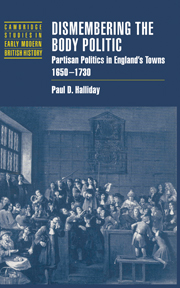Book contents
- Frontmatter
- Contents
- Preface
- List of abbreviations
- Part one Corporate ideal and partisan reality
- Part two The King and his corporations, 1660–1688
- Part three Partisan conflict and the law in a dynamic society
- Appendix A Royal charters of incorporation, 1660–1727
- Appendix B Enforcement of the Corporation Act, 1662–1663
- Select bibliography
- Index
- Titles in the series
Appendix B - Enforcement of the Corporation Act, 1662–1663
Published online by Cambridge University Press: 10 November 2009
- Frontmatter
- Contents
- Preface
- List of abbreviations
- Part one Corporate ideal and partisan reality
- Part two The King and his corporations, 1660–1688
- Part three Partisan conflict and the law in a dynamic society
- Appendix A Royal charters of incorporation, 1660–1727
- Appendix B Enforcement of the Corporation Act, 1662–1663
- Select bibliography
- Index
- Titles in the series
Summary
Thirty-six towns are studied here. Column A gives numbers dismissed from each rank in the corporation: mayor (or other head officer, including bailiffs, where there are two), aldermen (or those in a senior body by another name), councilmen (or those in a junior body by another name), and assistants (or those in a third body found in some towns). “Other” includes town clerks, recorders, and high stewards. Because the percentage of removals is critical, the number of members at each rank in the corporation according to its charter is given in column B. Column C gives the percentage of those dismissed from each rank.
The commissioners did not always note their reasons for removing officers; where known, these are given in the two right-hand columns: total removals for each reason in the first, and the percentage of those removed for each reason of all for whom the reason for removal is known. In row 1 are those removed for refusing to subscribe the declaration against the Covenant. In row 2 are those whom the commissioners removed arbitrarily, “for public safety.” In row 3 are those removed for refusing the declaration or one of the other oaths, the distinction being unclear in the evidence. In row 4 are those dismissed after failing to appear when the commissioners came to town. A statistical summary for all towns is presented at the end, followed by a list of sources consulted.
- Type
- Chapter
- Information
- Dismembering the Body PoliticPartisan Politics in England's Towns, 1650–1730, pp. 354 - 361Publisher: Cambridge University PressPrint publication year: 1998



